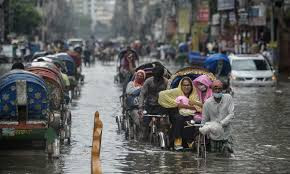WORLD NATURE CONSERVATION DAY
Dhaka on brink of climate collapse: Study
Ehsanul Haque Jasim, Dhaka
Published: 28 Jul 2025

File Photo: AFP
Firefighters in Dhaka increasingly face water shortages while battling blazes – a problem worsened by the city’s rapid loss of natural resources. From the 2024 Green Cozy Cottage mall fire on Bailey Road to the 2023 Bangabazar market inferno, access to water has been a critical challenge during major incidents.
The situation is linked to a sharp decline in the capital’s natural infrastructure.
A new study by the research organisation Change Initiative reveals that Dhaka has lost 60% of its waterbodies and half of its tree coverage since 1980.
“Dhaka is now on the verge of climate collapse,” said Change Initiative Chief Executive M Zakir Hossain Khan, presenting the study titled “Dhaka Without Nature? Rethinking Natural Rights-Led Urban Sustainability” at a report launch event on Sunday. This year’s theme for World Nature Conservation Day is “Restoration, Resilience and Responsibility” – a fitting call for action as the capital faces a deepening ecological crisis.
Using satellite imagery and urban heat mapping, the study shows Dhaka’s built-up area has expanded sevenfold in four decades, causing land surface temperatures to rise by 3-5°C. No area of the city now remains below 30°C, leaving it without any climate refuge.
“Unless immediate action is taken, Dhaka may follow Karachi’s path, which has become nearly uninhabitable due to environmental degradation,” warned Zakir.
He urged policymakers to adopt nature-based solutions inspired by models like Singapore, adapted to local realities and equity.
The study was jointly conducted by Zakir Hossain Khan, Sabrina Sultana and Md Fuad Hasan.
Ahead of World Nature Conservation Day, observed globally on 28 July, the study calls for urgent policy measures, including enacting laws to recognise the rights of nature, restoring lost waterbodies and enabling community-led stewardship of natural resources.
The report also notes that only 4.8% of Dhaka’s area is now covered by waterbodies, with zones like Sutrapur, Mirpur, Gendaria and Kafrul nearly dry. Just 6 out of 50 thanas meet the minimum standard for water body coverage.
Tree cover has declined from 21.6% to 11.6%, with most neighbourhoods far below the global green space benchmark of nine square metres per person. Adabar, Rampura, Kafrul, Bangshal and Wari have been identified as “tree deserts.”
However, some hope remains. Areas such as Uttarkhan and Turag still retain meaningful green and blue spaces, in contrast to central zones like Wari, Kotwali and Bangshal, which have lost nearly all ecological buffers.
Commenting on the findings, Prof Dr Ahmad Kamruzzaman Majumder, chairman of the Centre for Atmospheric Pollution Studies (CAPS), stressed the importance of observing World Nature Conservation Day in Bangladesh to raise awareness and drive policy changes.
Dr Riffat Mahmood, associate professor at the Department of Geography and Environment at Jagannath University, proposed practical steps. “Converting flyovers into vertical gardens, integrating environmental education into curricula and promoting community stewardship can all contribute to a greener, more resilient Dhaka,” he said.

